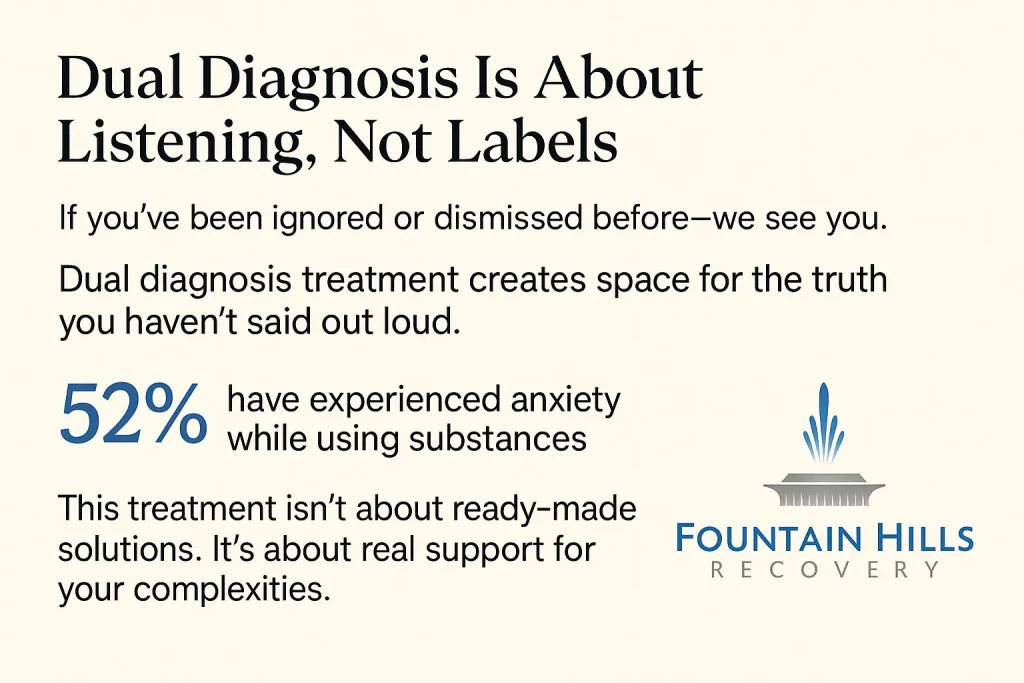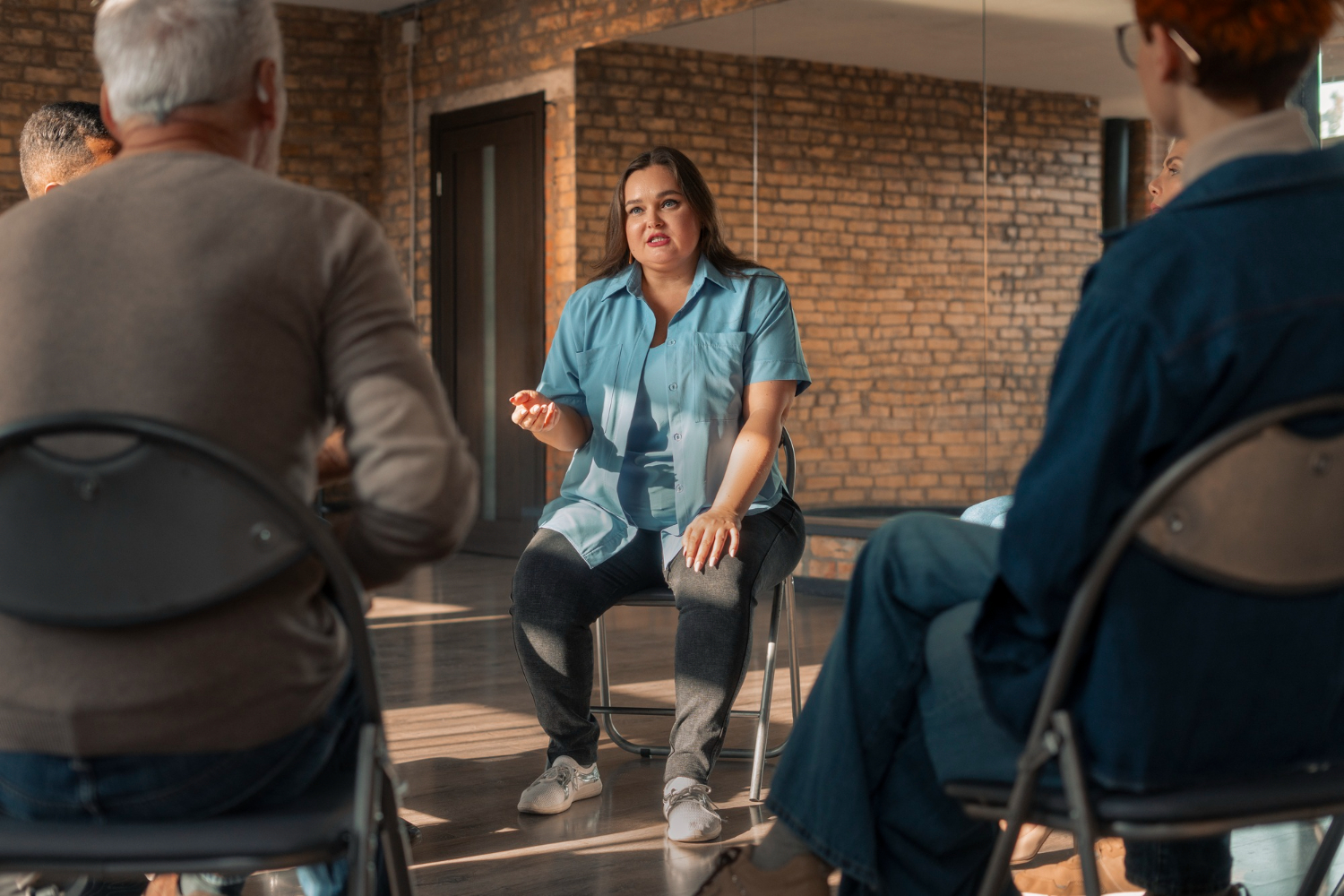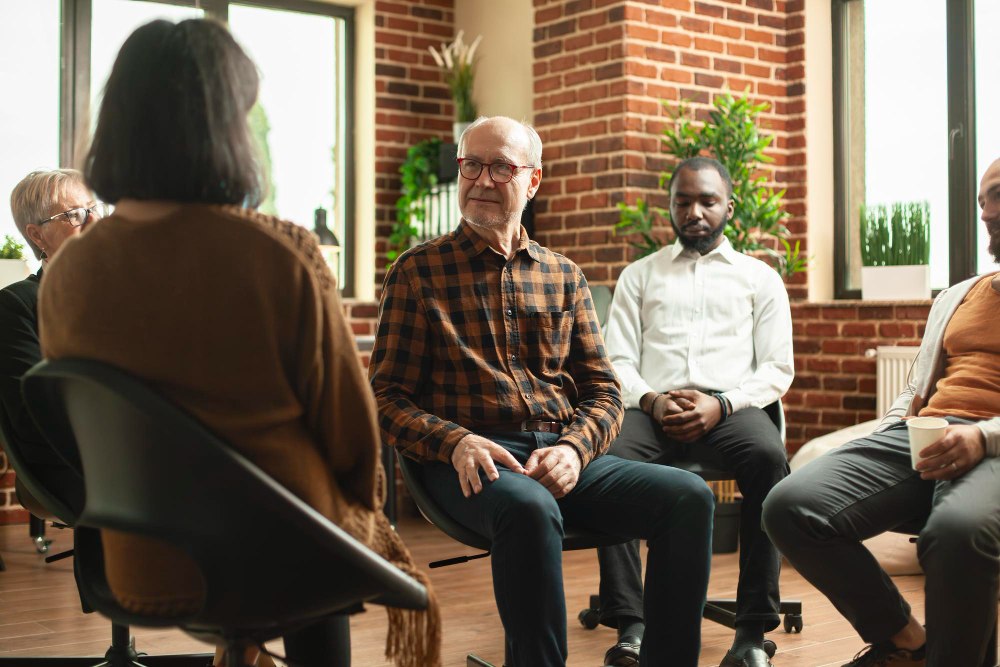You already know something’s not right.
You’ve tried to outwork the panic attacks, explain away the anger, minimize the nights that ended in numbness. You’ve told yourself it’s not that bad—other people have it worse. You’ve tried harder, longer. But it’s still there, that ache under everything: Something is off, and I can’t keep pretending it’s not.
If you’re considering treatment for the first time, you might be scared it means giving something up—your independence, your image, your identity. You might worry that once you start this, you’ll be labeled forever.
Here’s what you deserve to know: dual diagnosis treatment isn’t about what’s “wrong” with you. It’s about what’s real. What hurts. What helps. It’s not about turning you into someone else. It’s about helping you remember who you were before the survival strategies took over—and building something steadier from there.
Dual Diagnosis Isn’t About Labels—It’s About Listening
“Dual diagnosis” can sound clinical, but at its heart, it just means this: you’re dealing with both mental health challenges and substance use, and both deserve attention—at the same time, in the same space.
That might mean anxiety and alcohol. Depression and weed. PTSD and pills. Or symptoms you don’t even have names for yet—just a deep, daily sense that things feel too hard.
This type of treatment doesn’t divide you up into “mental health” on Mondays and “addiction” on Thursdays. It doesn’t pathologize you or reduce you to a checklist. It just says, You are allowed to be complicated. And you are still worth helping.
If You’ve Been Ignored or Dismissed Before—We See You
Maybe you’ve sat across from a doctor who waved off your symptoms. Maybe you’ve been told you’re “just sensitive,” “just tired,” or “just need to pray more.”
Maybe you’ve learned to keep things quiet—to look okay enough that no one asks questions. You get your work done. You show up. But inside, something hurts. Or feels flat. Or lost.
Dual diagnosis treatment creates space for the truth you haven’t said out loud. The truth you’ve been managing for years. Here at Fountain Hills Recovery, we believe early honesty is more important than early certainty. You don’t need to have a diagnosis in hand. You don’t even need to be sure you want help. You just need to be open to something different than this.
What Treatment Actually Looks Like
Let’s break it down—because when you’ve never done this before, the unknown can feel huge.
At Fountain Hills Recovery, dual diagnosis treatment starts with a conversation, not a judgment. You’ll meet with trained professionals who are there to listen—to everything. What you’ve been through. What you’re afraid of. What you want, even if you can’t fully name it yet.
You’ll go through a personalized assessment that looks at both substance use and mental health. That might include questions about your sleep, your moods, your energy, your triggers. But no one’s here to slap a label on you. This isn’t a test to pass or fail. It’s a map.
From there, your treatment might include:
- Trauma-informed therapy, where your past isn’t ignored or rushed through.
- Medication management, if it’s helpful—not forced.
- Peer groups with others who are navigating the same fog.
- Skills-building, so you’re not just “talking” about pain—you’re learning what to do with it.
- Support that adjusts as you do. No fixed formula. No factory model.
You won’t be told what to feel. You’ll be supported in figuring it out. Slowly. Safely. With people who’ve done this before.
You’re Not Signing Up to Be Someone Else
There’s this quiet fear many first-time treatment seekers have—especially if they’re creative, charismatic, intense, or deeply emotional:
What if recovery dulls me down?
What if I get medicated and lose my spark? What if I’m just numb in a different direction? What if the things that helped me cope—drinking, weed, workaholism—were also how I kept my edge, my identity, my fire?
That fear is real. And it deserves to be honored.
Here’s what dual diagnosis treatment understands: Your symptoms weren’t random. They were survival strategies. Your substance use wasn’t about weakness—it was about relief. And your pain? It shaped you.
But pain doesn’t have to be your compass forever.
We don’t take your spark. We help you protect it—from burnout, from chaos, from collapse. Dual diagnosis care is about helping you create a life where you don’t have to burn down your body or your brain just to feel something. It’s about making room for feeling that’s sustainable. Honest. Yours.

What If You Don’t Have a Diagnosis?
That’s not a problem—it’s a beginning.
You don’t have to come into dual diagnosis treatment with a name for what’s wrong. You don’t have to say “I have bipolar” or “I’m an addict” to get support.
You can just say: I don’t feel okay. And I’m open to finding out why.
We’ll walk with you—step by step. Maybe you’ll learn your anxiety has a name. Maybe your trauma responses start making more sense. Maybe it turns out you don’t meet criteria for a specific diagnosis, but you still deserve care.
Dual diagnosis treatment doesn’t require certainty. It welcomes curiosity. And it offers clarity at a pace that doesn’t overwhelm.
You Don’t Have to Be “Ready Forever.” Just Ready Right Now.
Let’s drop the idea that there’s a perfect moment for treatment. That you have to hit bottom, or hit pause on your life, or feel brave every day. You don’t.
You just have to feel tired enough of managing alone that you’re willing to try something else.
That’s what dual diagnosis treatment is: a try. A space to explore what healing might feel like—not in theory, but in your actual body, your actual life.
You can walk in unsure. You can walk in scared. You can even walk in skeptical.
But please know: you can still walk in.
Frequently Asked Questions About Dual Diagnosis Treatment
What makes dual diagnosis different from regular rehab or therapy?
Most traditional treatment programs focus on either mental health or substance use—but not both. Dual diagnosis integrates care for both at once, recognizing how deeply they interact. If you’ve ever felt like your anxiety fueled your drinking, or your depression got worse during sobriety, this kind of care is built for you.
Do I have to be using drugs or alcohol to qualify?
No. Many people come into dual diagnosis treatment after they’ve stopped using—or if they use occasionally but don’t feel “addicted.” If your substance use is connected to how you manage mental health symptoms, you’re in the right place.
What if I’m afraid of being medicated?
That’s okay. You’ll never be forced into medication at Fountain Hills Recovery. If it’s recommended, it will be discussed openly, with your full input. You’re allowed to say no. You’re allowed to ask questions. The goal is to support you, not silence you.
Is dual diagnosis treatment residential or outpatient?
We offer both. For some people, full-time care in a peaceful setting is what’s needed to stabilize. For others, outpatient options allow you to stay connected to your life while receiving support. We’ll help you figure out what makes sense for you.
Will I be around other people like me?
Yes. Many of our clients are first-time seekers, high-functioning individuals, or people who’ve never felt like they “fit the mold” of addiction or mental illness. This space is for you—even if you’re not sure where you fit yet.
You Don’t Have to Carry This Alone.
Call (800) 715-2004 to learn more about dual diagnosis treatment in Fountain Hills, AZ. You’re not signing away your freedom. You’re reclaiming your footing.





